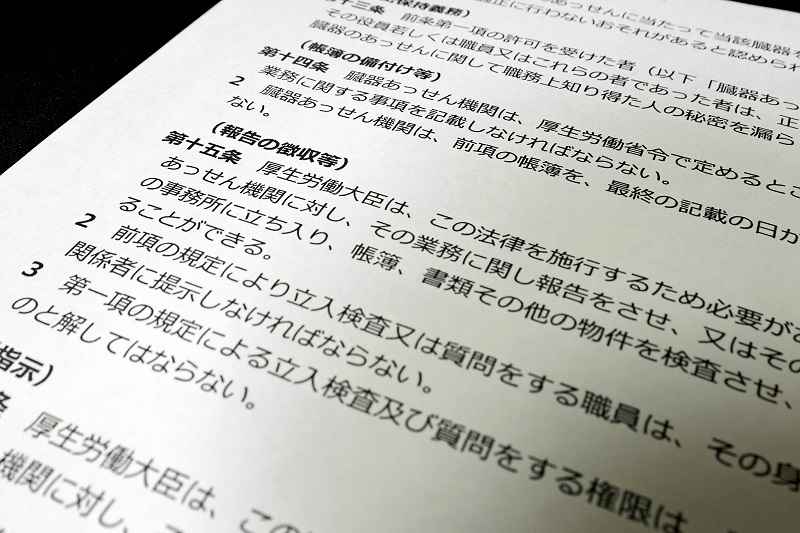
The text of the Organ Transplants Law
20:00 JST, September 21, 2022
Health ministry officials last month questioned the director of a Tokyo-based nonprofit organization about a case in which the entity is suspected of facilitating an overseas living-donor organ transplant that used a trafficked kidney, The Yomiuri Shimbun has learned.
The 62-year-old director denied any involvement in organ trafficking. The ministry is considering its next steps, but experts have indicated the Organ Transplants Law needs to be revised because the case has exposed shortcomings in the legislation, such as some cases falling beyond the reach of investigations under the law.
During his Aug. 31 hearing with the Health, Labor and Welfare Ministry, the director said that the NPO — the Intractable Disease Patient Support Association — had done nothing wrong. “Even if there were suspicions of organ trafficking, the NPO was not involved at all,” the director reportedly said.
In 2021, the NPO referred four Japanese patients for transplants in the central Asian nation of Kyrgyzstan. Recordings and other materials obtained by The Yomuiri Shimbun revealed that these patients paid a coordinator about $15,000 (about ¥2 million) as a “donor fee.” One Japanese patient who received a transplant from a Ukrainian donor became seriously ill. This prompted a health ministry decision to investigate the incident.
However, the hearing is not considered a formal procedure under the transplants law. “The bottom line is that this was no more than a voluntary meeting to confirm the facts of the case,” an official from the ministry’s organ transplantation office said.
The law prohibits organ trafficking and acting as an intermediary for transplants without authorization. However, the ministry has the power to search only transplant intermediary groups that have been authorized by the government. The ministry does not have the power to investigate nonprofit organizations and other groups, and it cannot impose penalties such as revoking a license.
Authority to act as a transplant intermediary extends only to transplants in which organs are removed from a dead or brain-dead donor. This authority does not extend to living-donor organ transplants.
It is said that the reason the law was written not to apply to living-donor transplants was to avoid impeding transplants between family members.
This rule is why cases such as the living-donor organ transplants conducted in Kyrgyzstan also fall outside of what would be considered unauthorized actions by an intermediary.
There have been other cases in which the condition of Japanese patients who received transplants overseas worsened after their operations, but a full picture of the situation had remained unclear because the ministry was unable to investigate these incidents.
The police have investigated cases in which violations of the transplants law were suspected, but such cases could not proceed because the transplants were conducted overseas and substantiating details of the operations and transfers of money was difficult.
“The government has absolutely no control over the actions of organizations that act as intermediaries for overseas transplants, so murky transplants are continuing unchecked,” said Naoshi Shinozaki, former executive director of the Japan Organ Transplant Network. “The system needs to be overhauled, such as by amending the transplants law to allow authorities to conduct inspections and to impose penalties.”
2 more set for Oct.
The NPO director has repeatedly denied the association was involved in organ trafficking.
“Although I cannot deny the possibility that some of the money paid by the NPO was passed to the donors, we have never issued any instructions or applied pressure on them,” he told The Yomiuri Shimbun in an interview on Sept. 15.
“It is 100% impossible for a Japanese person to go overseas and be able to receive a transplant operation just by paying medical fees,” the director insisted. “Wherever you go, there will be shadowy money transactions in the transplant world.”
When asked whether his NPO would continue serving as an intermediary for such cloudy transplants, he said, “Even if there is a possibility [of organ trafficking], our priority is saving our patients.”
The director said two patients were scheduled to go overseas for transplants “next month.”





















Discussion about this post